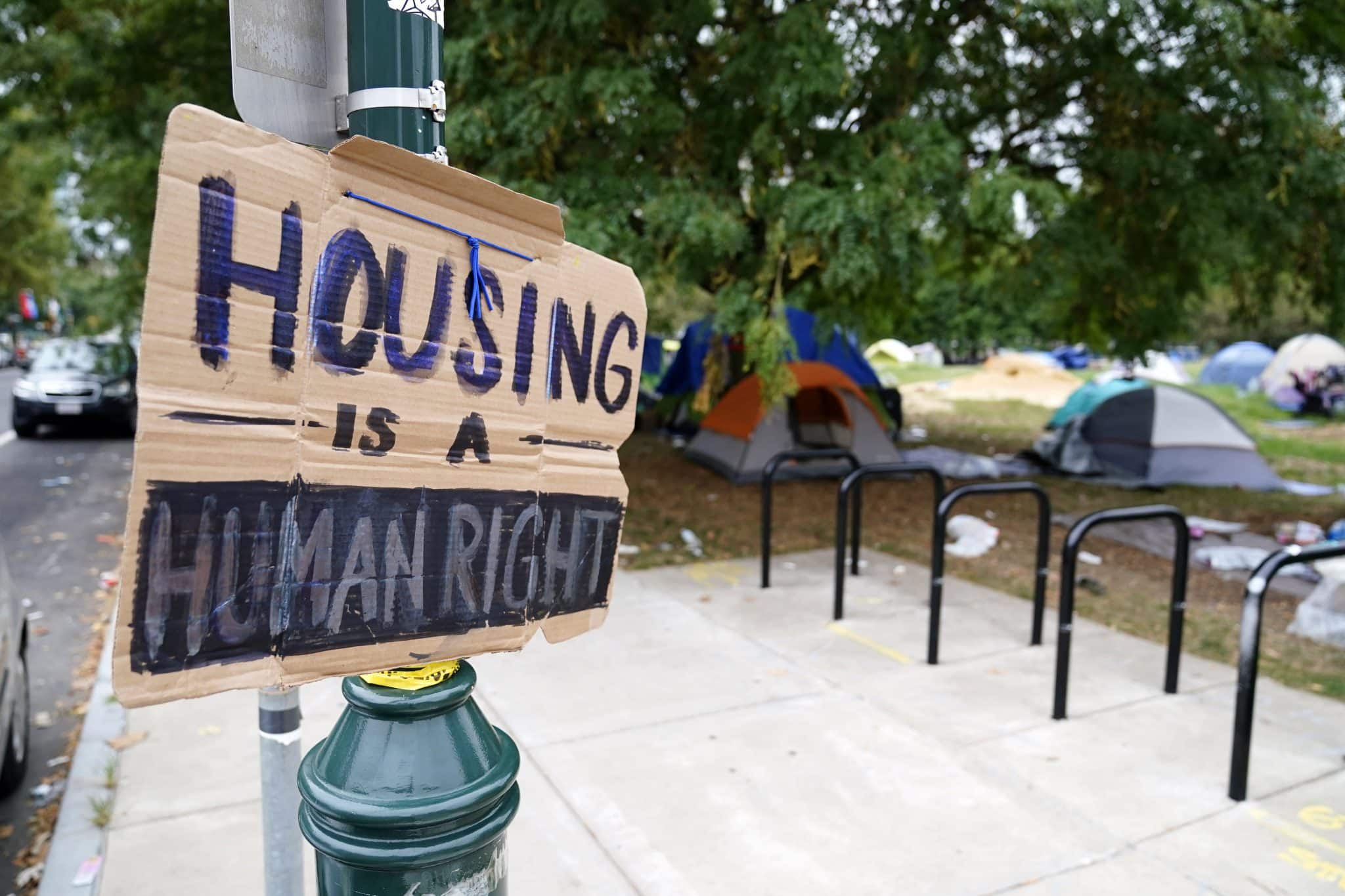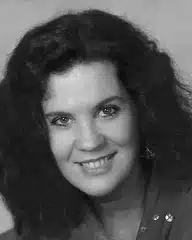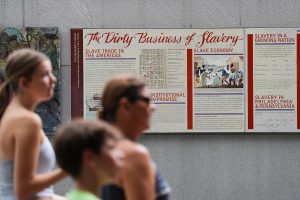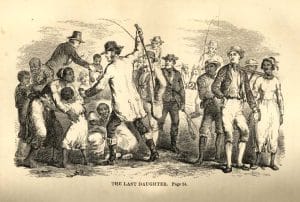November is National Hunger and Homelessness month and Democratic State Senator Nikil Saval and State Rep. Ismail Smith-Wade-El introduced sweeping legislation to protect the unhoused and their property from harassment by local and regional governments across the commonwealth.
Identical bills, Senate Bill 1089 in the senate and House Bill 2028, The Shelter First Act requires that municipalities, counties, or any other government entity provide “adequate alternative indoor space that is legally and physically accessible” to persons experiencing homelessness before the individual can be cited, fined, or evicted from a public space or private property when the owner has given written or verbal approval for the space to be occupied.
The bill gives a detailed definition of adequate, to include a place that does not require an individual to give up other rights in order to be there. The bill even includes a provision that dogs belonging to persons experiencing homelessness may not be separated from their owner.
Sam Tsemberis, the architect of Housing First – a highly successful approach to housing chronically homeless individuals – praised the new legislation. The National Low Income Housing Coalition states that Housing First reduces homelessness by 88 percent.
“Certainly in the world of homeless services, it’s the first bright spot I’ve seen in a long time,” said Tsemberis.
Truth is, since January, in the world of homelessness services, the news has gone from bleak to worse. Earlier this month, the Trump administration issued new sweeping regulations that will eliminate the Housing First program entirely – forcing hundreds of thousands of people back onto the streets and exacerbating the problem of homelessness, just as lawmakers nationally and here in Pennsylvania seek to criminalize unhoused living.
Eric Tars, senior policy director at the National Homelessness Law Center – an attorney who helped frame the bill – said that current life on the street is the worst he’s ever seen. “I will say as a homeless advocate, we have seen cruelty against people experiencing homelessness for decades, but I never thought I would see armed national guard troops sent out to destroy people’s tents.”
Tars went on to explain that if Pennsylvanians don’t want to see a military occupation of their cities – using the presence of homelessness as an excuse – then The Shelter First Act gives the Pennsylvania Attorney General the authority to, “bring a civil action on behalf of the Commonwealth against any State or local government or government official that violates, or implements or enforces a rule, ordinance, regulation, law, policy or practice that violates this chapter.”
Additionally, it directs courts to “hold unlawful and set aside the rule, ordinance, regulation, law, policy or practice if it is in violation of this section.” Thus precluding actions taken by the federal government.
What about the Trump Administration’s promise to sweep people from the streets and institutionalize them? Tars suggests that Saval and Smith-Wade-El’s bill could make that unlawful.
“When the Trump administration sent National Guard troops and federal agents into DC, we know that they said they weren’t enforcing any federal laws. They were only enforcing DC’s anti-camping laws against the homeless people that they were evicting,” said Tars. “They started in DC. But now we’ve seen them sending troops all across the country. Certainly towns in Pennsylvania could be next. But if we have this shelter first law, that will mean that those federal agents who come in, can only enforce the local laws. And if the local laws have to be in compliance with this [bill] – people will have to be offered some form of adequate shelter first.”
Tars added, “If Pennsylvania passes this, it will be the best law on the books.”
Diane Nilan, who led the fight for the rights of every child in the U.S. to access an education – free from barriers and regardless of housing status, spearheaded the now lauded federal McKinney-Vento Homeless Education Act. She is delighted that The Shelter First Act expands the definition of homelessness to include persons living in motels and with friends or neighbors – a situation known in homelessness circles as doubled up. Nilan also fought hard for the expanded definition when the U.S. Congress modified the McKinney-Vento laws to include the education of America’s youth.
READ: Bucks County State Rep. Jim Prokopiak Leads Roundtable Discussion on Housing Affordability Solutions
SB1089 sponsor Saval said that he prioritized that change based on information from housing advocates.
“A lot of people perceive homelessness as essentially a visible problem. Which, of course, is part of it. But it fails to capture the sheer amount of housing insecurity that is pervasive in our society,” said Saval. “People who are occasionally in extended stays or hotels or couch surfing are part of the overall population. Our systems struggle to capture that statistically, but it is a huge part of it.”
He noted that if those people don’t get counted, the problem can’t be adequately evaluated or dealt with. “We just want to be accurate, right? We want to try to support as many people as possible.”
Nilan added that this is especially important for affected children.
“First of all, there are kids in Pennsylvania living in these situations where they’re on the streets or in RVs or in other places that are described in this legislation,” she said.
Nilan says that once the definition of homelessness includes doubled-up, and motel living, that “it will make life a little easier for children and their families or whoever they’re living with.”
She said that acknowledging that homelessness encompasses one desperate living situation after another. “It humanizes it. It seems like being in a homeless situation doesn’t make you the worst person on this earth.”
And when asked what she thought of Saval and Smith-Wade-El’s work, Nilan responded simply, “Oh, I love this bill,” adding, “I want to see Pennsylvania pass this sucker because it is a dream bill that needed to be passed, oh, 40 years ago.”
The legislation doesn’t just not criminalize, it guarantees the rights of these community members sleeping in the rough, or in their car, or in the woods – and it protects their stuff.
The bill states what should be obvious. It makes seizure or destruction of private property owned by persons experiencing homelessness illegal – just as walking into a person’s home and seizing their possessions is now.
Darcy, 35, and Mike, 39, live in a tent on a rented parking space in a central Pennsylvania town. They don’t pay the rent for the parking space; a downtown businessman does.
Until Dave, a 38-year-old aviator, took an interest in Darcy and Mike, they’d been constantly hassled – shoved along by the police. They’d had their property confiscated repeatedly, often while they were at work.
The couple met on the street. Mike’s been clean and sober for 13 months. Darcy – a victim of domestic violence – finally fell into homelessness after a house fire devastated her home. They’ve tried to get into shared living situations, but most of their would-be roommates drink or use substances and Mike’s sobriety is too important to him. “If it hadn’t been for Dave,” Mike said, “I’d be back in jail.”
They both work full-time at a warehouse. They have a difficult time saving money because storing and cooking food is pretty near impossible. Eating meals – even fast food meals – doing laundry and paying for showers gets expensive.
When they got together, Darcy and Mike stayed in the park, but people with homes kept calling the cops on them. One woman told them to their faces that they needed to leave, “Now!”
Mike said that he got up and started following her. She asked where he thought he was going and Mike said, “To your house. You just told me I can’t stay here.” Then, she too called the police.
The community where they live has no ordinance against sleeping out, but the cops repeatedly ask them to move. For a while they slept under a bank drive-through awning. “Somebody called the cops and said we were robbing the bank.”
Darcy explained what happened next.
“We started sleeping on the church steps. But then they posted signs that we couldn’t. That’s when we met Dave and his wife. He rents a parking space for us and bought us a tent.” At night they have a bucket in the tent. They walk several blocks to empty it in a port-a-potty or tie the contents up in a zipper closure bag and dispose of it in a trash can.
Four weeks ago, Darcy lost the last thing she had. Doubled over in pain, Mike took her to the hospital. Darcy delivered a 22-week stillbirth. The next day she returned to her home in the parking space, grateful she wouldn’t be forced to move from place to place for a few nights as she recovered from the loss.
When told about the proposed legislation that would protect their stuff, Mike clapped. “We can’t take someone’s house even though we need one. They shouldn’t be able to take our stuff.”
Tsemberis tried to explain the impact when community leaders and authorities can discard the few belongings persons experiencing homelessness have.
“Picking up people’s things with that level of disregard for their value to the person is just another step along the way. We don’t value people who don’t have a place to live,” said Tsemberis. “The disregard for their rights is a disregard for including them as citizens in our community, the way we include everybody else. Somehow not only do they lose housing, but they lose community membership, lose rights. It’s structural.”
Saval believes their bill is the first step in deconstructing the cruelty inherent in a system that punishes people like Mike and Darcy, just because they have no home.
“I just generally think that people have goodwill towards each other,” said Saval. “If you were to ask [Pennsylvanians] whether they felt someone who was sleeping outside, because they had nowhere else to go, should be punished for that with fines or with jail, I think that most people would say no.”
Saval believes that since housing is one-half to one-third as expensive as incarceration, change can be affected when criminalization is taken off the table. “You’re dealing with people who know in their hearts, truly, that the solution is not to punish people for what they are pushed to do.”
Will SB1089 and HB2028 solve all the problems?
“No. I think we need many solutions to this crisis,” said Saval. “We need to be preserving housing. We need to be building more of it. But at the very least, if you do not have options in your community, the solution cannot be jail. The solution cannot be punishment.”
But, he said, his bill can at the very least do one thing: “I think it does seek to provoke people to think of alternative models.”







